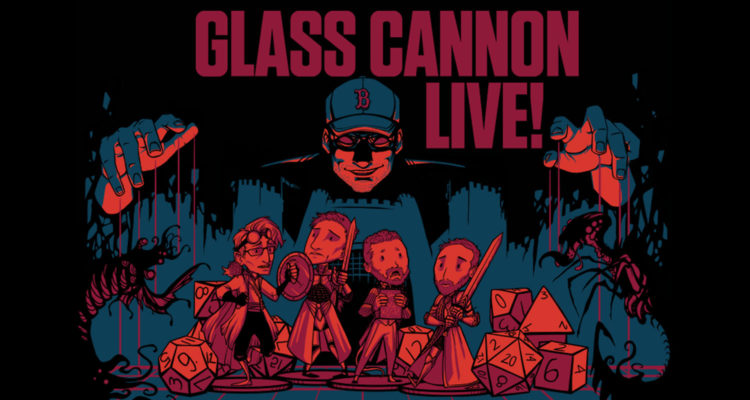Dungeons & Dragons is having a moment. There are three main factors to this: a recent edition that’s very accessible to new players, a boost into the pop culture consciousness thanks to being part of the Stranger Things phenomenon, and the rise of “actual play” shows where entertaining people play these games and record them for other folks to hear. Critical Role and The Adventure Zone are the most famous, but there are dozens of “actual play” shows that cater to different playstyles, attention spans, and levels of seriousness.
The Glass Cannon Network has been on the rise for a few years now with long-running games of Pathfinder and Starfinder officially supported by the company that makes them, Paizo. They’ve launched a national tour of live Glass Cannon shows where they play their game on stage. That tour is set to make a stop at Turner Hall Ballroom on April 14.
“I had been acting, doing stand-up, and auditioning in New York since I finished grad school in 2003,” says Glass Cannon founder and CEO Troy Lavallee. “Any time I was waiting for things to pop, which was all the time, I was constantly throwing stuff against the wall to see what would stick. I would write pilots and film them with my friends, do sketch comedy, you name it. As I got back into tabletop role-playing games after a 20 year hiatus, the way my brain works is that I can’t just enjoy a hobby casually without thinking ‘How can I turn this into something?’
“I was listening to a bunch of podcasts at the time with stand-up comedians and thought that maybe I’d enjoy some RPG podcasts,” he continues. “At the time, you could count on one hand how many there were out in the ether. I listened to one or two of the most popular ones at the time and couldn’t help but think my home group was light years more entertaining than what was out there. We should make a podcast. And here we are.”
“Actual play” shows illustrate what’s fun about tabletop role-playing. It’s a little bit group storytelling, a little bit improv class, and a little bit game night. Fans of these shows come for the stories or to see their favorite games get played, and they also develop attachment to the characters in the show and the performers behind them.
“Right around the release of the 100th episode of our flagship show,” says Lavallee, “we decided to do our first live in-person show at a now defunct game store in Queens, New York. We put 40 or so tickets up for sale, and not only did they sell out within a couple of days, but we noticed people from all over the country were buying tickets and flying or driving in from far away to attend. After the show, we walked across the street to a dive bar with the fans and as we started to sign autographs and take photos with people who knew more about our show than we did, I remember realizing, ‘Okay, this is happening.'”
Most shows in the genre play Dungeons & Dragons because of its popularity. But as the “actual play” genre grows, more and more shows expand into other games and genres. L.A. By Night, for example, popularized the most recent edition of gothic fantasy Vampire: The Masquerade. Glass Cannon built its show on Pathfinder, a rebooted version of an older D&D rules set. The show has recently spun off into smaller series of other RPGs such as Dune: Adventures In The Imperium, and Blades In The Dark.
“Once we started getting accustomed to the fact that we had a legit profitable business on our hands,” says Lavallee, “we had to start looking for ways to scale. The low hanging fruit option was to try our hand at other RPGs to either try to rope in the fans of those RPGs into our network, expose our current fans to games they may have never heard of, or have an excuse to learn and play new games. As much as we’re businessmen, we’re also big geeks that love gaming. The beauty of expanding into these new games and genres is that we were able to see what resonated most with listeners, and we could create new properties centered around what was getting the most hype.”
Livestreaming has helped pull away the curtain drawn around RPGs thanks to the Satanic panic of the ’80s. It’s a dorky yet social activity not that much different from running a fantasy football team. In the past, it had a sort of apprenticeship element where a new player had to be drawn into an existing group, but “actual play” has encouraged full groups of friends to take the plunge together.
“I think livestreaming RPGs has made the hobby more accessible to people who otherwise would have been intimidated to jump in,” says Lavallee. “You pick up a 600-page tome like the Pathfinder Core Rulebook, and if you’re never played an RPG, it’s easy to start reading it and feel like you’re trying to learn Mandarin. But watching the game in action and seeing the infectious fun people have while playing makes viewers not only want to do it, but feel like they can.”
Exclusive articles, podcasts, and more. Support Milwaukee Record on Patreon.

